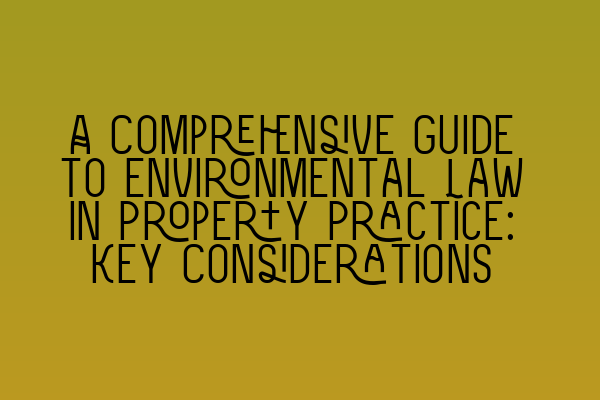As a solicitor specializing in property law, it is crucial to have a comprehensive understanding of environmental law and its implications in property practice. This guide aims to provide you with key considerations and insights into the world of environmental law.
Environmental law governs the relationship between humans and the environment, aiming to protect, manage, and sustain our natural resources. In property practice, environmental law plays a vital role in ensuring that buildings, land, and developments are in compliance with environmental regulations. Failure to comply with these regulations can have serious legal, financial, and reputational consequences.
1. Environmental Impact Assessments (EIA):
One of the key considerations is conducting an Environmental Impact Assessment (EIA) for any development or construction project. An EIA evaluates the potential environmental effects of a project before it is undertaken. This assessment helps identify any potential risks and develop effective strategies to mitigate them. It is important to engage with qualified environmental consultants to conduct EIAs in compliance with the law.
2. Contaminated Land:
Another crucial consideration in property practice is contaminated land. The presence of hazardous substances, pollutants, or contaminants can have serious implications for property owners and developers. It is essential to conduct thorough due diligence to identify any potential contamination risks, comply with legal obligations, and mitigate any potential legal liabilities.
3. Planning and Development:
Environmental law is intertwined with the planning and development process. Local authorities require developers to address environmental concerns when submitting planning applications. The impact on wildlife, air quality, noise pollution, and the ecological balance must be assessed and addressed. Failure to comply with these requirements can result in planning permission being denied or legal challenges being made against the development.
4. Energy Efficiency and Sustainability:
Sustainability is an increasingly important aspect of property practice. The government’s focus on reducing carbon emissions and achieving energy efficiency targets means that property owners and developers must consider environmental impact. From incorporating renewable energy sources to implementing energy-efficient systems, there are numerous legal requirements and incentives to consider in creating sustainable properties.
5. Listed Buildings and Conservation Areas:
If you are dealing with listed buildings or properties in conservation areas, it is important to be aware of the regulatory and legal obligations. These properties are often subject to additional restrictions and protections to preserve their historical and architectural significance. Carrying out any alterations or renovations without proper consent can lead to legal consequences.
6. Water Management and Flooding:
Water management and flooding are significant considerations, particularly in properties located in flood-prone areas. Understanding the legal responsibilities and requirements for flood risk assessments, drainage, and flood defenses is crucial. Additionally, property owners should be aware of any rights and responsibilities related to watercourses or groundwater extraction.
7. Wildlife and Protected Species:
Environmental law also aims to protect wildlife and endangered species. Property owners and developers must consider the impact of their projects on local ecosystems and protected species. Certain habitats and species are legally protected, and any harm or disturbance to them can lead to legal consequences. Understanding the legal requirements and engaging experts in ecological impact assessments can help navigate these concerns efficiently.
In conclusion, environmental law is a critical aspect of property practice. By understanding the key considerations and complying with legal obligations, you can ensure that your property transactions and developments are environmentally responsible and legally compliant. To further your understanding and prepare for your upcoming SQE exams, we recommend exploring our related articles: SQE 1 Practice Exam Questions, SQE 1 Practice Mocks FLK1 FLK2, SQE 2 Preparation Courses, SQE 1 Preparation Courses, and SRA SQE Exam Dates.
Remember, environmental law is constantly evolving, so staying updated with legislative changes and seeking expert advice is crucial to providing the best legal counsel to your clients.
